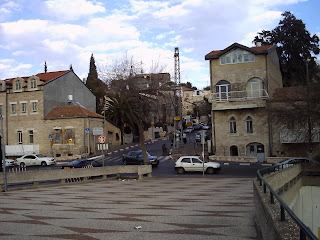On the way to Ariel, our bus passed countless Arab villages, obvious with the prominent towers on the village mosques. The way to the Shomron is hilly, and the bus had to venture through many winding roads, which overlook valleys scattered with shrubs and boulders. During many parts of the trip, the billboards and signs were written only in Arabic. When we would drop people off in their settlements, we would have to pass through check points with armored patrols waiting for us, showing clearly that places like Maalei Levonah and Shiloh are not in the most safe of areas. Even Ariel had a check point at the entrance.
Overall, Shabbos was very relaxing. The local university is situated on the top of a mountain overlooking a huge valley. Across the valley are Arab villages, which look like stars at night. It was a very nice and easy way to spend Shabbos. I enjoyed seeing my friend, as we hadn't seen each other in quite a while. The only distraction was that everyone was dati leumi, or "national religious" (most like American Modern Orthodox). Being chareidi, I stuck out plainly, and when I used clear Ashkenazi (eastern European) pronunciation when I was called to the Torah, a few people snickered at this overt non-Israeliness. When I asked about the location, and whether or not students feel worried there, my response was, "Oh, actually I've never wanted to look at Ariel's location on a map. The less I know, the better I feel." And so it goes...

On the way back, a large group of "settlers" got on the bus in Shiloh. These settlers stand out because of their unique look: men with long, unkempt pey'ot (sidelocks near their ears), large knitted yarmulkes, and women wearing flowy dresses with large turban-like tichels (scarves used to cover the hair of married women). For both men and women, two things are the same: sandals and rifles. One of the settlers sat next to me, dressed in his army uniform, rifle on his shoulder, and holding a baby in each arm. The difference was interesting: me, black suit and hat, on my way back to a yeshiva that goes out of its way to speak of "eretz Yisroel" (the land of Israel) instead of "medinat Yisrael" (the state of Israel), and a chardal (chareidi dati leumi, or ultra-orthodox national religious) soldier traveling with his wife, two babies, and gun to report back to defending the medina (state). All the while the two of us are sitting next to one another, our bus wove through the hills dotted with Arab villages sporting Palestinian and Jordanian flags at the entrances.
I've heard people say that the relationship between the "Torah world" (world of ultra-Orthodox Jewry) living in Israel and the assortment of Zionist groups is the same as the relationship between the shevet (tribe) of Zevulun and that of Yissachar. In that relationship, one group sustained the world by devoting their lives to learning Torah, with the other shevet supporting them by earning money to support them. In the modern case, though, it is interesting to see how the ones supposed receiving the help are so withdrawn, and in most cases opposed, to those offering protection. As we see it, if all Jews would simply live a life according to Torah and true Judaism, the world opinion could not help but be in favor of Israel, and security would come simpy through the light of true Torah. However, the Zionists and soldiers say that since this cannot be at the current time, hey must do the job until then....and so goes the circle. The unreligious and misguidedly religious army exists to offer safety needed because so many Jews are unreligious and misguided.
Finally, after 90 minutes on the road, we arrived back into Jerusalem. As we approached the central bus station, I once again felt at home, seeing men frocked in black scurry behind strollers (dodging HAIL!! A rare sight in Israel.) on streets and sidewalks packed with those who have found a way to live in the medina without being part of it. Ha'lavai.












